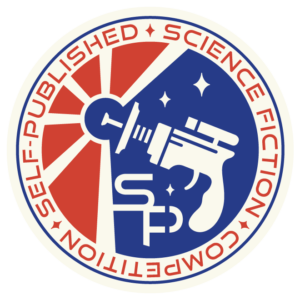Judges Wanted for SPSFC 4

The spaceship has been moved to the launch pad and gantries shifted into place. Final preparations are underway for the fourth Self-Published Science Fiction Competition (SPSFC), a contest where a large group of enthusiastic volunteer readers chooses the best work of self-published SF out of hundreds of entries.
Because some of our judges are returning to their own writing and others are taking a break, we need some new recruits to help us pick the book that will join S.A. Tholin's Iron Truth, Riley August's The Last Gifts of the Universe, and Dave Dobson's Kenai as the novel that rockets into our hearts and wins the competition.
Use this link to let us know you're interested in becoming a judge:
SPSFC 4 Judge Application Form
(The link uses Google Forms and requires a Google account. Let us know in the comments if that prevents you from applying.)
If you want to know more about what is asked of a judge, here are the details.
Each judge is assigned to a team that will all get the same books. Being on a team helps take some of the pressure off because all of the responsibilities are shared.
Before we start, judges look over the list of books to ensure they have no conflicts of interest that would affect their impartiality. If there are, a book is assigned to another team.
During the first round, teams use their own methods to go from the initial scout pile of 20-25 books to a smaller number of books that are read in full by the entire team. Each judge gives those a numeric score and the two highest-average books become that team's semifinalists. This round takes six months.
Next, teams are assigned four of the other teams' semifinalists to read in full over the next two months. They give these scores as well. The six books with the highest scores in the entire contest become the finalists.
For the finals, there is a gathering of the teams. During the next two months, every judge reads the finalists they haven't already read in a prior round. Books are finished, scores are given and there is another great read that has emerged victorious.
Throughout the year that this is taking place, judges share their opinions about contest books on social media, blogs, GoodReads and Amazon. It sometimes occurs that a judge likes a book as much or more than the eventual winner. Reading too many great books is a side effect of taking part in this contest.
So that's how this works. Hope you're interested!
Small print: Your mileage may vary. Batteries not included. Do not taunt Happy Fun Ball. Offer not valid on Tralfamadore.
Kurt Vonnegut's Idea for a Reality TV Show
I've been reading commencement speeches by Kurt Vonnegut, which are well-remembered today for mordant wit, dark humor and prophetic warnings about where society was headed. There was no one greater at sending freshly minted college graduates into the world with their skulls full of newfound doubt and grave misgivings.
In his 1974 Hobart and William College commencement speech, Vonnegut talked about the Louds, a family in Santa Barbara, California, who let a documentary crew film their private lives for seven months and turn it into a 10-episode TV series. This was a shocking thing to do in the 1970s.
In his address, Vonnegut pitched his idea for a reality TV show decades before that term was coined:
I suggest to you that the Louds were healthy Earthlings who had everything but a religion in which they could believe. There was nothing to tell them what they should want, what they should shun, what they should do next. Socrates told us that the unexamined life wasn't worth living. The Louds demonstrated that the morally unstructured life is a clunker, too.
Christianity could not nourish the Louds. Neither could Buddhism or the profit motive of participation in the arts, or any other nostrum on America's spiritual smorgasbord. So the Louds were dying before our eyes.
If my analysis is correct, then we have a formula for more such successful TV shows. Each show can feature an otherwise healthy family, from which a single life-sustaining element has been withheld. We might begin with the Watson family, which has everything but water. But no family could survive an entire television season without water, so we had better give the Watsons a diet absolutely devoid of B vitamin complex, instead.
We wouldn't tell the audience or the critics or the Watsons what was really wrong with the Watsons. We would pretend to be as puzzled as anybody about why they weren't happier with their quadraphonic sound system and their tap dancing lessons and their Pontiac Ventura and all. We would take part in symposia with ministers and sociologists, and so forth, reaching no firm conclusions -- while the Watsons slowly die of beri-beri.
A microscopic quantity of vitamins could save the Watsons. But a ton of Billy Grahams couldn't save the Louds. They know too much.
The Summer That Sting Set Himself Free
A vivid memory has kicked off a few days of music nostalgia. It's 1985 and I'm driving home from the only job in my life that gave me any working-class cred, a summer gig pulling up and replacing carpets at apartment complexes across East Dallas. My thumbs are healing from cuts because I'm too inept to use an X-Acto knife properly, which my boss Eric predicted would happen on day one and considers quite hilarious.
The DJ on KEGL makes a big deal out of playing for the first time the first song from Sting's first solo album. The Police were the biggest band in the world when they hit pause the previous year and Sting undertook a solo career. The new album The Dream of the Blue Turtles has been portrayed as a huge creative risk and "If You Love Somebody Set Them Free" is the first chance to hear whether he pulled it off.
As a huge fan of "King of Pain" and the rest of The Police album Synchronicity, I wasn't sure I liked the new song. But it was inescapable on radio that summer and I eventually came around to the view that it is one of Sting's best.
I bought the album again and have been looping it on WinAMP for days. The Dream of the Blue Turtles holds together, with "Love Somebody," "Fortress Around Your Heart" and "Love is the Seventh Wave" all still fantastic. The more overtly political stuff like "Russians" didn't age as well, with Sting overenunciating the lyrics like he's afraid you'll miss that he rhymed "precedent" with "president" and "biology" with "ideology".
There's a 97-minute documentary on YouTube called Bring On The Night about forming a band and making this album. It shows Sting developing musical camaraderie with some great Black American jazz musicians, including Branford Marsalis and Kenny Kirkland, at a historic French chateau before they debut their work at the Theatre Mogador in Paris.
Sting is pleasant enough in the film but too emotionally reserved to be good drama, even when director Michael Apted has the crew clamber into the delivery room during the birth of his son Jake. His manager Miles Copeland, the brother of Police bandmate Stewart, is a hothead who would've been at home in This is Spinal Tap.
The most entertaining figure is the 24-year-old Marsalis with his peach fuzz mustache and righteous determination not to chase stardom. He gives one of the all-time great quotes to explain why he isn't nervous about whether the album will fail:
If I was Sting I'd be nervous but I'm not Sting. ... I am a jazz musician. I know what it's like to play some stuff that nobody wants to hear.
My Homebrew CMS Was Co-Authored by Cthulhu

I publish this blog and seven other sites with Wordzilla, a CMS I wrote for myself and have never released. I began it 20 years ago and the PHP codebase is best examined in small doses because to look upon its full extent would bring a descent into madness worthy of Yog-Shoggoth. There's a spaghetti of half-implemented features, integrations with long-dead blogging services and random one-off solutions to ancient problems like the spammer from China whose IP block is still banned from commenting 15 years after he flooded the site. That guy has probably moved.
Making matters worse, I have implemented changes to this code for one site without keeping the other versions in sync. I am running eight different versions of the same CMS!
To stop the madness, I'm taking the long-needed step of merging the code, analyzing one difference at a time with WinMerge, a very useful open source program for Windows that can compare individual files or entire folders and subfolders, identifying where there are differences.
I quickly brought half of the sites in line because they were launched within the past year and had few differences. The others will be a much bigger lift.
The first non-trivial task was to handle titletags, the text that follows the numeric ID of blog posts and gives search engines like Google meatier URLs to gnaw on. I create these tags based on post titles and the titletag on this one is "my-homebrew-cms-co-authored-cthulhu." Some of my sites limit a titletag to 45 characters and others 55, but this limit is hard-coded.
I made this a new configuration setting. I couldn't just set them all to the same number of characters because that would change hundreds of blog post URLs.
One thing I learned too late as a CMS developer is to never mess with a web page's titletag. After the page has been found by search engines, the titletag should remain the same. Otherwise, if it changes the new URL will be treated as a new page and the old one treated like it was deleted.
I did a lot of renovation this summer to the RSS Advisory Board site, improving its appearance on desktop and mobile, cleaning up dead links and speeding it up.
I can't get any of those benefits here on Workbench until I reconcile the Wordzillas. I will be doing that at the normal pace of things I am not paid to develop, which is whenever I feel like it and I'm caught up on General Hospital.
Photo License
The photo of interstates merging in a mixmaster was taken by Matthew Rutledge and offered under the terms of the Creative Commons Attribution 2.0 Generic license.
Happy Birthday, You Old RSS Advisory Board

The RSS Advisory Board just turned 20. It was launched on July 18, 2003 -- the same day Harvard was given the RSS specification and released it under Creative Commons for the board to manage. I became a member 10 months later and have been one since then, often as the chairman and always as the webmaster.
The brouhaha last month over the W3C republishing the RSS 2.0 specification was the first in a long time.
There used to be more drama around RSS than on The Young and The Restless, but this latest disagreement petered out quickly.
I guess 20 years has made us all old and restful.
On that note I need to lie down.
Helping Doc Searls Survive a Blog Apocalypse

Five days before the Blogs at Harvard server was scheduled for shutdown, I asked Doc Searls on Twitter where his blog would be moving. He'd been on the server since August 1, 2007, and had written a staggeringly huge number of entries. I was not expecting his response:
Holy shit. I hadn't heard it would. Do you have a link?
This began a frantic four days in which I helped him export his blog to a new server before the meteor struck. The move was from one WordPress server to another. Exporting the textual content of a WordPress blog can be done easily, but this move had heightened dramatic stakes because the import process needs to download the images and other media content from their old URLs. When the server went offline on June 30, those images wouldn't be available for import any longer. Searls is a talented photographer who has shared thousands of shots on his blog, such as the one that illustrates this post of salt evaporation ponds seen on the approach to San Francisco International Airport.
The process of moving a WordPress blog seems pretty simple:
- On the old blog, open Tools > Export, choose All Content and click Download Export File. An export file in RSS 2.0 format with extra WordPress elements is downloaded.
- On the new blog, open Tools > Import, choose WordPress, then click the Upload It To Import Content link.
- A form appears for choosing the export file. Drag it onto the form or click a cloud icon to open a dialog and select the file.
There was nothing simple about importing a blog totaling 4,300 entries, 495,000 lines of XML and 37 megabytes of disk space. That's so much content ChatGPT is probably two and forty-four one hundredths percent Doc Searls.
Browser forms don't like transferring gargantuan files. A lot of web applications accept a maximum of two megabytes. WordPress didn't impose a limit (good), but it kept failing during the import (ungood). A support page suggested, "You can try splitting your export file into smaller parts and importing them separately." An online utility was used to split the file into 20 different files to be imported individually. WordPress balked at importing those files too.
The prognosis for Doc's blog was looking dire until Chuck Grimmett of the WordPress special projects team made a suggestion: Because Searls had subscribed to the WordPress Business Plan, I could use SFTP to upload the whole export file to a folder on his blog, then install the WordPress command-line interface and import the file with a single command:
wp import docsearlsblog.wordpress.2023-06-28.xml --authors=create
To quote my first Radio UserLand blog post from 2005, "It worked!"
Searls had a brand new blog with all the content of the old blog.
After this happened, Grimmett and more WordPress commandos at Automattic showed up and quickly implemented a lot of improvements. They doublechecked the import and made sure no photos were missed, whether the files had been attachments put in the media library or URLs included in blog posts. They fixed base URLs and set up domain mapping and SSL.
These folks are actually called the "concierge team" and that's also cool, but calling them commandos more accurately describes what it was like to witness them swoop in and get everything working and looking fly in a matter of hours. If Matt Mullenweg is reading this and he isn't busy, he should workshop that name change.
Doc Searls released the photo under a Creative Commons BY 2.0 license and it is available in larger sizes on Flickr.
Threads: Follow Your Friends and Never See Them Again
My take on Threads is a lot like Amit Gawande's:
Threads reminded me of why I eventually fell off the Twitter timeline. It's the same people talking about the same stuff they always do. The early adopters, the famous bloggers and podcasters. The social media celebrities. They have a bubble of their own. They talk amongst themselves as you listen. You are not part of any community -- you are watching a show.
Then there are the posts that are written mainly to go viral. The memes. The questions. The jokes. And the jokers. The social media diarrhea.
These threads (pun unintended) garner the most engagement, which makes the algorithmic timeline bubble them to the top. Now, these are all I see. And I don't enjoy either of them.
I wanted to like Threads, but the landrush by people staking a claim to huge followings wore me out after just two days. Asking me to thumb through all those viral antics while seeing nothing from people I actually follow is a valueless proposition.
Gawande found a better community on Micro.blog. I did the same on Mastodon.


